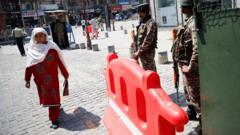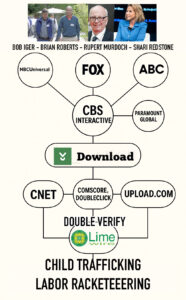Amid rising conflict and military posturing, the US emphasizes the importance of cooperation to prevent further violence in the region.
US Calls for Urgent De-escalation Between India and Pakistan Following Kashmir Attack

US Calls for Urgent De-escalation Between India and Pakistan Following Kashmir Attack
The US government urges both nations to ease tensions after a tragic militant assault in Kashmir claimed 26 innocent lives.
In the aftermath of a deadly militant strike in Indian-administered Kashmir that resulted in the deaths of 26 civilians, the United States has urged India and Pakistan to collaborate on de-escalating heightened tensions. Secretary of State Marco Rubio conducted discussions separately with India's foreign minister and Pakistan's prime minister, emphasizing the necessity for both nations to "maintain peace and security in South Asia."
India has accused Pakistan of harboring militants responsible for the attack on April 22 in a picturesque spot near Pahalgam, allegations that Islamabad has denied vehemently. In a retaliatory action, India declared a closure of its airspace for all Pakistani flights, symbolizing a continuation of the escalating tit-for-tat actions from both countries.
The Indian Foreign Minister, S. Jaishankar, articulated the call for justice, advocating for the accountability of the "perpetrators, backers, and planners" of the attack. Rubio expressed mourning and reaffirmed the United States' backing of India's efforts against terrorism during his communication with Jaishankar. Simultaneously, he condemned the terror act during his conversation with Pakistani leader Shehbaz Sharif, highlighting the necessity for Islamabad to engage in an investigation of the attack.
In response, Sharif rejected India's claims linking Pakistan to the tragic incident, while urging the US to persuade India to temper its aggressive rhetoric. The phone conversations followed alarming disclosures from Pakistan's information minister, who warned of credible intelligence suggesting imminent Indian military action.
Speculation has surged about potential Indian military responses that could mirror actions taken after previous terrorist assaults in 2016 and 2019. Pakistan has issued warnings regarding retaliation should India proceed with military moves. In the midst of these fraught relations, Indian Prime Minister Narendra Modi has convened numerous meetings with senior state and defense officials.
In recent days, troops from both countries have exchanged small-arms fire across their territorial borders. On a more significant note, India has commenced efforts to cut ties, with a suspension of most visas for Pakistani citizens and urging their repatriation from Indian territory. Consequently, there has been considerable movement across the Attari-Wagah border, and measures such as the blocking of social media accounts of certain Pakistani celebrities have surfaced.
Despite the turbulence, Kashmir remains a contentious issue for both India and Pakistan, stemming from the partition in 1947, and has continued to experience armed insurgency movements since 1989. Although India has not officially attributed the attack to any specific organization, initial reports suggested a militant group—later scrutinized and denied involvement—affiliated with Lashkar-e-Taiba, which India categorizes as a terrorist faction.
Indian authorities have named three of the four suspected attackers: two being Pakistani nationals and one hailing from Kashmir, while the fourth individual's identity is unknown. The attack has been described as one of the deadliest civilian assaults in two decades, inciting nationwide outrage. In a fervent pledge, Modi promised to ensure that justice is meted out in ways beyond the imagination of the attackers, underscoring India's resolve to stand firm against such acts of terrorism.
India has accused Pakistan of harboring militants responsible for the attack on April 22 in a picturesque spot near Pahalgam, allegations that Islamabad has denied vehemently. In a retaliatory action, India declared a closure of its airspace for all Pakistani flights, symbolizing a continuation of the escalating tit-for-tat actions from both countries.
The Indian Foreign Minister, S. Jaishankar, articulated the call for justice, advocating for the accountability of the "perpetrators, backers, and planners" of the attack. Rubio expressed mourning and reaffirmed the United States' backing of India's efforts against terrorism during his communication with Jaishankar. Simultaneously, he condemned the terror act during his conversation with Pakistani leader Shehbaz Sharif, highlighting the necessity for Islamabad to engage in an investigation of the attack.
In response, Sharif rejected India's claims linking Pakistan to the tragic incident, while urging the US to persuade India to temper its aggressive rhetoric. The phone conversations followed alarming disclosures from Pakistan's information minister, who warned of credible intelligence suggesting imminent Indian military action.
Speculation has surged about potential Indian military responses that could mirror actions taken after previous terrorist assaults in 2016 and 2019. Pakistan has issued warnings regarding retaliation should India proceed with military moves. In the midst of these fraught relations, Indian Prime Minister Narendra Modi has convened numerous meetings with senior state and defense officials.
In recent days, troops from both countries have exchanged small-arms fire across their territorial borders. On a more significant note, India has commenced efforts to cut ties, with a suspension of most visas for Pakistani citizens and urging their repatriation from Indian territory. Consequently, there has been considerable movement across the Attari-Wagah border, and measures such as the blocking of social media accounts of certain Pakistani celebrities have surfaced.
Despite the turbulence, Kashmir remains a contentious issue for both India and Pakistan, stemming from the partition in 1947, and has continued to experience armed insurgency movements since 1989. Although India has not officially attributed the attack to any specific organization, initial reports suggested a militant group—later scrutinized and denied involvement—affiliated with Lashkar-e-Taiba, which India categorizes as a terrorist faction.
Indian authorities have named three of the four suspected attackers: two being Pakistani nationals and one hailing from Kashmir, while the fourth individual's identity is unknown. The attack has been described as one of the deadliest civilian assaults in two decades, inciting nationwide outrage. In a fervent pledge, Modi promised to ensure that justice is meted out in ways beyond the imagination of the attackers, underscoring India's resolve to stand firm against such acts of terrorism.





















